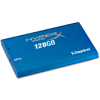- Qualcomm Launches Snapdragon 4 Gen 2 Mobile Platform
- AMD Launches Ryzen PRO 7000 Series Mobile & Desktop Platform
- Intel Launches Sleek Single-Slot Arc Pro A60 Workstation Graphics Card
- NVIDIA Announces Latest Ada Lovelace Additions: GeForce RTX 4060 Ti & RTX 4060
- Maxon Redshift With AMD Radeon GPU Rendering Support Now Available
Kingston HyperX Max 3.0 128GB Portable SSD

Often on the go and require a super-fast storage solution to take along? Portable SSDs are not exactly new, but they are constantly being improved. Though Kingston was a bit late to the party with its HyperX Max 3.0, we’ve found it to be the best portable SSD we’ve tested to date. It features huge speeds, and very good performance consistency.
Page 3 – CrystalDiskMark, ATTO, Real-World
Over the past year, many storage companies have been jumping on the CrystalDiskMark bandwagon to help strut their product’s performance, and it’s easy to understand why. Compared to others, CrystalDiskMark delivers results that are much higher, and in some regards, they could be considered unrealistic given that real-world tests and even other synthetic benchmarks never seem to back up its claims. We include it for the sake of interest and because it is still a very thorough benchmark.


Similar to our HD Tune tests, Kingston’s drive falls just behind the other portable SSD solutions in the read test, but soars ahead in the write. That could well be the reason the PCMark Vantage score was so high… reliable write speed counts for a lot.
ATTO
While CrystalDiskMark does well to show the absolute top-end value of a storage device, ATTO doesn’t fall too far behind, if at all. Its test uses a wide-range of cluster sizes, for both read and write, but we only note 4KB, 64KB and 1024KB of the former. For those interested, we use a queue depth value of 10 for testing.

This chart is a bit difficult to read, given the three tests are quite different in execution, but overall, Kingston’s drive performs well here. It again doesn’t manage to exceed Super Talent and OCZ in the throughput race, but it’s not specced as high, either, so it’s to be expected.
Real-World
For real-world testing, we use a set of files and folders for the sake of measuring transfer speeds, and also convert images and music on the storage device to see just how well it fares for large intensive operations. For the transfer speeds, we use both 4GB and 16GB files and folders, and for the former, we also perform copy tests, which refers to copying the file or folder on the storage device. We don’t do this for our 16GB files and folders as some 32GB drives refuse it due to coming so close to the total density.

Kingston’s drive offers superb performance here, being able to copy over a 4GB file in a mere 23 seconds, and a 4GB folder in 65 seconds.

Continuing the great performance here, Kingston’s drive keeps up close to OCZ’s Enyo, though falls just a bit behind in the folder copy test – one area where an ultra-high IOPS can prove beneficial.

Here, Kingston’s drive managed to beat out the rest of the pack, and I’m not quite sure of the reason. The results were repeatable, though, so Kingston has something good on its hands when it comes to overall performance, a fact that PCMark helps back up.
Support our efforts! With ad revenue at an all-time low for written websites, we're relying more than ever on reader support to help us continue putting so much effort into this type of content. You can support us by becoming a Patron, or by using our Amazon shopping affiliate links listed through our articles. Thanks for your support!





